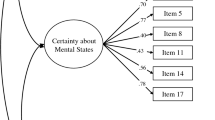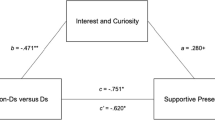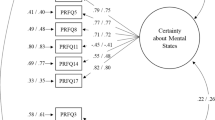Abstract
Research on parental reflective functioning (PRF)—defined as parents’ capacity to comprehend the developing mind of their child, reflect upon it, and hold in mind the inner life of the child—has mostly involved mothers of infants and young children, and rarely fathers and parents of school-aged children. The present study sought to extend research on PRF by examining aspects of the construct that are still scarcely explored, such as the role of gender and attachment; to investigate whether there were differences between mothers’ and fathers’ PRF and whether there were differences in PRF related to the gender and age of the child; and, finally, to assess the association between PRF and each parent’s attachment style. The Parental Reflective Functioning Questionnaire (PRFQ) and the Attachment Style Questionnaire (ASQ) were administered to a community sample of mothers and fathers of 385 children aged 3–10 years. A multi-group factor analysis supported the hypothesized three-factor model among both fathers and mothers. Univariate and multivariate analyses of variance showed that mothers had higher levels of interest and curiosity in their children’s mental states than fathers. Parents of daughters showed higher pre-mentalizing modes than parents of sons. Parents of preschool children showed less nonmentalizing modes than parents of children aged 8–10. Correlations between PRFQ and ASQ showed that both mothers’ and fathers’ interest in thinking about their child’s internal experience and in taking the child’s perspective were correlated with higher levels of secure attachment style. Research implications are discussed.

Similar content being viewed by others
References
American Psychological Association (2010). Ethical principles of psychologists and code of conduct. http://apa.org/ethics/code/index.aspx.
Arnott, B., & Meins, E. (2007). Links among antenatal attachment representations, postnatal mind-mindedness, and infant attachment security: A preliminary study of mothers and fathers. Bulletin of the Menninger Clinic, 71, 132–149. doi:10.1521/bumc.2007.71.2.132.
Bartholomew, K. (1990). Avoidance of intimacy: An attachment perspective. Journal of Social and Personal Relationships, 7(2), 147–178. doi:10.1177/0265407590072001.
Beaujean, A. A., Freeman, M. J., Youngstrom, E., & Carlson, G. (2012). The structure of cognitive-abilities in youths with manic symptoms: A factorial invariance study. Assessment, 19, 462–471. doi:10.1177/1073191111399037.
Benbassat, N., & Priel, B. (2012). Parenting and adolescent adjustment: The role of parental reflective function. Journal of Adolescence, 35, 163–174. doi:10.1016/j.adolescence.2011.03.004.
Borelli, J. L., StJohn, H. K., Cho, E., & Suchman, N. E. (2016). Reflective functioning in parents of school-aged children. American Journal of Orthopsychiatry, 86, 25–36. doi:10.1037/ort0000141.
Camoirano, A. (2017). Mentalizing makes parenting work: A review about parental reflective functioning and clinical interventions to improve it. Frontiers in Psychology, 8, 14 doi:10.3389/fpsyg.2017.00014.
Cassibba, R., Coppola, G., Sette, G., Curci, A., & Costantini, A. (2017). The transmission of attachment across three generations: A study in adulthood. Developmental Psychology, 53, 396–405. doi:10.1037/dev0000242.
Cheung, G. W., & Rensvold, R. B. (2002). Evaluating goodness-of-fit indexes for testing MI. Structural Equation Modeling, 9, 235–255. doi:10.1207/S15328007SEM0902_5.
Cohen, J. (1992). A power primer. Psychological Bulletin, 112, 155–159.
De Haas, M. A., Bakermans-Kranenburg, M. J., & van IJzendoorn, M. H. (1994). The Adult Attachment Interview and questionnaires for attachment style, temperament, and memories of parental behavior. Journal of Genetic Psychology, 155, 471–486.
Ensink, K., Normandin, L., Plamondon, A., Berthelot, N., & Fonagy, P. (2016). Intergenerational pathways from reflective functioning to infant attachment through parenting. Canadian Journal of Behavioural Science, 48, 9–18. doi:10.1037/cbs0000030.
Esbjørn, B. H., Pedersen, S. H., Daniel, S. I. F., Hald, H. H., Holm, J. M., & Steele, H. (2013). Anxiety levels in clinically referred children and their parents: Examining the unique influence of self-reported attachment styles and interview-based reflective functioning in mothers and fathers. British Journal of Clinical Psychology, 52, 394–407. doi:10.1111/bjc.12024.
Feeney, J. A., Noller, P., & Hanrahan, M. (1994). Assessing adult attachment. In M. B. Sperling & W. H. Berman (Eds.), Attachment in adults: Clinical and developmental perspectives (pp. 122–158). New York, NY: Guilford Press.
Fonagy, P., Gergely, G., & Target, M. (2007). The parent-infant dyad and the construction of the subjective self. Journal of Child Psychology and Psychiatry, 48, 288–328. doi:10.1111/j.1469-7610.2007.01727.x.
Fonagy, P., Steele, M., Steele, H., Moran, G. S., & Higgitt, A. C. (1991). The capacity for understanding mental states: The reflective self in parent and child and its significance for security of attachment. Infant Mental Health Journal, 12, 201–218. doi:10.1002/1097-0355(199123)12:3<201::AID-IMHJ2280120307>3.0.CO;2-7.
Fonagy, P., & Target, M. (1997). Attachment and reflective function: Their role in self-organization. Development and Psychopathology, 9, 679–700.
Fonagy, P., Target, M., Gergely, G., & Jurist, E. (2002). Affect regulation, mentalization, and the development of the self. New York, NY: Other Press.
Fossati, A., Feeney, J. A., Donati, D., Donini, M., Novella, L., & Bagnato, M., et al. (2003). On the dimensionality of the Attachment Style Questionnaire in Italian clinical and nonclinical subjects. Journal of Social and Personal Relationships, 20, 55–79. doi:10.1177/0265407503020001187.
George, C., Kaplan, M., & Main, M. (1985). Adult Attachment Interview. Berkeley, CA: University of California.
Grossmann, K., Grossmann, K. E., Kindler, H., & Zimmermann, P. (2008). A wider view of attachment and exploration: The influence of mothers and fathers on the development of psychological security from infancy to young adulthood. In J. Cassidy & P. R. Shaver (Eds.), Handbook of attachment: Theory, research, and clinical applications (pp. 857–879). New York: Guilford Press.
Hazan, C., & Shaver, P. R. (1987). Romantic love conceptualized as an attachment process. Journal of Personality and Social Psychology, 52, 511–524.
Hollingshead, A. B. (1975). Four factor index of social status. New Haven, CT: Yale University. Unpublished working paper.
Katznelson, H. (2014). Reflective functioning: A review. Clinical Psychology Review, 34, 107–117. doi:10.1016/j.cpr.2013.12.003.
Kochanska, G., Murray, K. T., & Harlan, E. T. (2000). Effortful control in early childhood: Continuity and change, antecedents, and implications for social development. Developmental Psychology, 36, 220–232. doi:10.1037/0012-1649.36.2.220.
Lamb, M. E., & Lewis, C. (2004). The development and significance of father-child relationships in two-parent families. In M. E. Lamb (Ed.), The role of the father in child development. (4th ed., pp. 272–305). New York, NY: Wiley.
Lucassen, N., Tharner, A., van Ijzendoorn, M. H., Bakermans-Kranenburg, M. J., Volling, B. L., & Verhulst, F. C., et al. (2011). The association between paternal sensitivity and infant-father attachment security: A meta-analysis of three decades of research. Journal of Family Psychology, 25, 986–992. doi:10.1037/a0025855.
Luyten, P., Mayes, L., Nijssens, L., & Fonagy, P. (2017). The parental reflective functioning questionnaire: Development and preliminary validation. PLoS ONE, 12, e0176218 doi:10.1371/journal.pone.0176218.
Madsen, S. A., Lind, D., & Munck, H. (2007). Men’s abilities to reflect their infants’ states of mind: Interviews with 41 new fathers on experiences of parenthood. Nordic Psychology, 59, 149–163. doi:10.1027/1901-2276.59.2.149.
Meins, E., & Fernyhough, C. (1999). Linguistic acquisitional style and mentalising development: The role of maternal mind-mindedness. Cognitive Development, 14, 363–380. doi:10.1016/S0885-2014(99)00010-6.
Ordway, M. R., Sadler, L. S., Dixon, J., & Slade, A. (2014). Parental reflective functioning: Analysis and promotion of the concept for paediatric nursing. Journal of Clinical Nursing, 23, 3490–3500. doi:10.1111/jocn.12600.
Pazzagli, C., Laghezza, L., Manaresi, F., Mazzeschi, C., & Powell, B. (2014). The circle of security parenting and parental conflict: A single case study. Frontiers in Psychology, 5, 887. doi:10.3389/fpsyg.2014.00887.
Powell, B., Cooper, G., Hoffman, K., & Marvin, B. (2013). The Circle of Security Intervention: Enhancing attachment in early parent-child relationships. New York, NY: Guilford Press.
R Development Core Team. (2012). Writing R extensions. Vienna: R Foundation for Statistical Computing. http://CRAN.R-Project.org/doc/manuals/R-exts.html.
Raffaelli, M., Crockett, L., & Shen, Y.-L. (2005). Developmental stability and change in self-regulation from childhood to adolescence. Journal of Genetic Psychology, 166, 54–75.
Roisman, G. I., Holland, A., Fortuna, K., Fraley, R. C., Clausell, E., & Clarke, A. (2007). The Adult Attachment Interview and self-reports of attachment style: An empirical rapprochement. Journal of Personality and Social Psychology, 92, 678–697. doi:10.1037/0022-3514.92.4.678.
Rosseel, Y. (2012). Lavaan: An R package for structural equation modeling. Journal of Statistical Software, 48, 1–36. doi:10.18637/jss.v048.i02.
Rostad, W. L., & Whitaker, D. J. (2016). The association between reflective functioning and parent–child relationship quality. Journal of Child and Family Studies, 25, 2164. doi:10.1007/s10826-016-0388-7.
Rutherford, H., Booth, C., Luyten, P., Bridgett, D., & Mayes, L. (2015a). Investigating the association between parental reflective functioning and distress tolerance in motherhood. Infant Behavior and Development, 40, 54–63. doi:10.1016/j.infbeh.2015.04.005.
Rutherford, H., Goldberg, B., Luyten, P., Bridgett, D., & Mayes, L. (2013). Parental reflective functioning is associated with tolerance of infant distress but not general distress: Evidence for a specific relationship using a simulated baby paradigm. Infant Behavior and Development, 36, 635–641. doi:10.1016/j.infbeh.2013.06.008.
Rutherford, H., Maupin, A. N., Landi, N., Potenza, M. N., & Mayes, L. C. (2017). Parental reflective functioning and the neural correlates of processing infant affective cues. Social Neuroscience, 12, 519–519. doi:10.1080/17470919.2016.1193559.
Rutherford, H., Wallace, N., Laurent, H., & Mayes, L. (2015b). Emotion regulation in parenthood. Developmental Review, 36, 1–14. doi:10.1016/j.dr.2014.12.008.
Schermelleh-Engel, K., Moosbrugger, H., & Müller, H. (2003). Evaluating the fit of structural equation models: Test of significance and descriptive goodness of fit measures. Methods of Psychological Research Online, 8, 23–74.
Sharp, C., & Fonagy, P. (2008). The parent’s capacity to treat the child as psychological agent: Constructs, measures and implications for developmental psychopathology. Social Development, 17, 737–754. doi:10.1111/j.1467-9507.2007.00457.x.
Slade, A. (2005). Parental reflective functioning: An introduction. Attachment and Human Development, 7, 269–281. doi:10.1080/14616730500245906.
Slade, A., Grienenberger, J., Bernbach, E., Levy, D., & Locker, A. (2005). Maternal reflective functioning, attachment, and the transmission gap: A preliminary study. Attachment and Human Development, 7, 283–298. doi:10.1080/14616730500245880.
SPSS Inc. (2009). PASW Statistics for Windows. Chicago, IL: SPSS Inc. ReleasedVersion 18.0.
Stacks, A. M., Muzik, M., Wong, K., Beeghly, M., Huth-Bocks, A., Irwin, J. L., & Rosenbaum, K. L. (2014). Maternal reflective functioning among mothers with childhood maltreatment histories: Links to sensitive parenting and infant attachment security. Attachment and Human Development, 16, 515–533. doi:10.1080/14616734.2014.93 5452.
Steele, H., & Steele, M. (2005). Understanding and resolving emotional conflict: The London parent–child project. In K. E. Grossmann, K. Grossmann & E. Waters (Eds.), Attachment from infancy to adulthood. The major longitudinal studies (pp. 137–164). London: Guilford Press.
Stifter, C. A., & Spinrad, T. L. (2002). The effect of excessive crying on the development of emotion regulation. Infancy : the official journal of the International Society on Infant Studies, 3, 133–152. doi:10.1207/S15327078IN0302_2.
Stover, C. S., & Kiselica, A. (2014). An initial examination of the association of reflective functioning to parenting of fathers. Infant Mental Health Journal, 35, 452–461. doi:10.1002/imhj.21459.
Tronick, E. Z., & Cohn, J. F. (1989). Infant-mother face-to-face interaction: Age and gender differences in coordination and the occurrence of miscoordination. Child Development, 60, 85–92. doi:10.2307/1131074.
van de Schoot, R., Lugtig, P., & Hox, J. (2012). A checklist for testing measurement invariance. European Journal of Developmental Psychology, 9, 486–492. doi:10.1080/17405629.2012.686740.
Van de Vijver, F. J. R., & Hambleton, P. M. (1996). Translating tests: Some practical guidelines. European Psychologist, 1(2), 89–99.
van IJzendoorn, M. H. (1995). Adult attachment representations, parental responsiveness, and infant attachment: A meta-analysis on the predictive validity of the Adult Attachment Interview. Psychological Bulletin, 117, 387–403. doi:10.1037/0033-2909.117.3.387.
van IJzendoorn, M. H., & De Wolff, M. S. (1997). In search of the absent father—Meta-analyses of infant–father attachment: A rejoinder to our discussants. Child Development, 68, 604–609. doi:10.2307/1132112.
Verhage, M. L., Schuengel, C., Madigan, S., Fearon, R. M. P., Oosterman, M., & Cassibba, R., et al. (2016). Narrowing the transmission gap: A synthesis of three decades of research on intergenerational transmission of attachment. Psychological Bulletin, 142, 337–366. doi:10.1037/bul0000038.
Author Contributions
C.P.: collaborated with the design and execution of the study, assisted with the data analyses, and wrote the paper. E.D.: analyzed the data, wrote the results, and collaborated in the writing and editing of the final manuscript. V.R.: collaborated with the execution of the study, and in editing of the final manuscript. C.M.: collaborated with the design and execution of the study, and collaborated in the writing and editing of the final manuscript. P.L.: collaborated in the writing and editing of the final manuscript.
Author information
Authors and Affiliations
Corresponding author
Ethics declarations
Conflict of Interest
The authors declare that they have no competing interests.
Ethical Approval
All procedures performed in studies involving human participants were in accordance with the ethical standards of the institutional and/or national research committee and with the 1964 Helsinki declaration and its later amendments or comparable ethical standards.
Informed Consent
Informed consent was obtained from all individual participants included in the study.
Rights and permissions
About this article
Cite this article
Pazzagli, C., Delvecchio, E., Raspa, V. et al. The Parental Reflective Functioning Questionnaire in Mothers and Fathers of School-Aged Children. J Child Fam Stud 27, 80–90 (2018). https://doi.org/10.1007/s10826-017-0856-8
Published:
Issue Date:
DOI: https://doi.org/10.1007/s10826-017-0856-8




